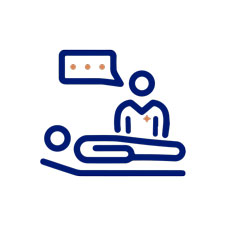What is dyslipidemia?
THE Dyslipidemia It is characterized by changes in cholesterol/triglycerides and contributes to increased cardiovascular risk. It is one of the most common diseases in industrialized societies.
The absolute value of total cholesterol, per se, does not mean pathology, disease. Total cholesterol may be elevated at the expense of good cholesterol (HDL), of the bad (LDL), triglycerides (TG) and/or combinations of all three (hypercholesterolemia, hypertriglyceridemia, mixed dyslipidemia). Therefore, before jumping to conclusions, consult your attending physician/endocrinologist/cardiologist so they can analyze all the factors and provide you with the best possible guidance.
High good cholesterol protects you from cardiovascular events. The others must be below certain values and are not the same for everyone, on the contrary, they differ according to the cardiovascular risk of each of us (excess weight/obesity? diabetes mellitus? high blood pressure? smoker? sedentary? family history of cardiovascular events? sleep apnea? hepatic steatosis?, among others).
What can increase bad cholesterol (LDL) It's mainly tobacco, a sedentary lifestyle, certain medications, and poor diet (in addition to genetics). Regarding diet, the fats we consume are different, and there are "good" and "bad" fats.
The consumption of trans fats should be eliminated from the diet. These are present in some types of cookies, chocolates, sweet and savory snacks, sauces, and fast food (pizzas, burgers, soups, and pre-cooked and frozen meals). They also exist in vegetable fats modified to be solid at room temperature, as is the case with some types of margarine.
To the saturated fats are present in foods of animal origin, such as meat and meat products (chorizos, sausages, farinheira, black pudding), offal (livers, gizzards, offal), fatty dairy products and their derivatives, and also in pastry and confectionery products, and should also be avoided.
In turn, the unsaturated fats These are "good" fats found in oily and oily fish, olive oil, nuts, vegetable oils (sunflower, flaxseed, soybean, olive oil), seeds, and vegetable oils. Omega-3 and -6 are examples of unsaturated fats.
The World Health Organization (WHO) indicates that a healthy adult can ingest up to 70 g of fat per day, with a maximum of 20 g of saturated fat and the remainder (50 g) of unsaturated fat.
How to identify fats? Learn to read packaging labels:
Food labels indicate the amount of total fat and saturated fat per 100g of food and per serving, as well as the percentage of the recommended daily intake. If the amount of total fat is very similar to the amount of saturated fat, it's because the fat present is all of "poor" quality (saturated), and therefore, you should look for another food with a greater difference (less saturated fat and more unsaturated fat, therefore).
Fat / Lipids:
- low content: 3g or less
- medium content: between 3 g and 17.5 g
- high content: more than 17.5 g
Saturated Fat:
- low content: 1.5 g or less
- medium content: between 1.5 g and 5 g
- high content: more than 5 g
In turn, the triglycerides have to do with another quality of food. They are mainly the result of excess sugar (found in excess fruit, soft drinks, and alcohol) and white flour, wheat flour, savory snacks, pizza, white pasta, white bread, cakes, pastries and confectionery, cookies and crackers, and desserts (in addition to the genetic load, of course, which, for now, no one can escape from genes).
It is also necessary to practice physical exercise, increase the intake of fiber and whole grains, unsaturated fats, eliminate sweets and added sugars, soft drinks and alcohol, sweets and always prefer whole grain-rich foods, instead of white ones.
Regarding fruit, eat about three pieces per day, respecting both dimensions. You can eat all fruits, as long as you respect the quantities. Thus, we assume as one piece of fruit 50g of banana, grape, fig, persimmon; 100g of apple, kiwi, apricot, plum, peach, orange, pear, tangerine, mango, cherry, and pineapple; and 200g of strawberries, raspberries, blackberries, blueberries, papaya, melon, cantaloupe, and watermelon; half an avocado / half a mango; 150ml of natural fruit juice (so a 450ml juice, even if natural, is already three pieces of fruit a day, without the benefit of ingesting the fiber that is wasted in making the juices, unless you make it at home and put everything in a blender and make it the traditional way). smoothie with ice and without added sugar of course).

Signs and symptoms
Dyslipidemia is often silent.

Causes
- Harmful lifestyle habits;
- Genetic alterations;
- Endocrine diseases, such as hypothyroidism.
Medical Specialist
in Dyslipidemia
Dr. Rosa Dantas
- She has a degree in Medicine with a specialization in Endocrinology and Nutrition.
- He holds the degree of Consultant in Endocrinology and Nutrition.
- She is a researcher in national and international clinical research projects.
- Author and co-author of scientific articles published in national and international journals.
- He is a member of several national and international scientific societies in the field of Endocrinology, Diabetes and Obesity.

Medical Specialist
in Dyslipidemia
Dr. Selma Souto
- She has a degree in Medicine with a specialization in Endocrinology and Nutrition.
- She was a guest lecturer at the Faculty of Medicine of the University of Porto.
- He is currently Vice-President of the Portuguese Society of Endocrinology, Diabetes and Metabolism (2024-2026).
- He is a member of several national and international scientific societies in the field of Endocrinology, Diabetes and Obesity.
- Author and co-author of more than 20 book chapters in the area of Obesity and Diabetes.


